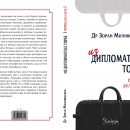This EU-mediated agreement between Serbia and Kosovo -- reached in Brussels after three days of negotations -- gives new status to Pristina in the international community, and may help pave the way for Belgrade's accession into the EU.

This EU-mediated agreement between Serbia and Kosovo -- reached in Brussels after three days of negotations -- gives new status to Pristina in the international community, and may help pave the way for Belgrade's accession into the EU.
Both EU Enlargement Commissioner Stefan Fule and foreign policy chief Catherine Ashton welcomed the agreement as a "major step forward". Ashton described it as “particularly welcome” in view of upcoming deliberations on offering Serbia official candidate status.
In her statement, US Secretary of State Hillary Clinton said "We also hope these agreements will open the door to Serbia’s EU candidacy. Serbia’s progress towards European integration is good for Serbia, good for Kosovo, and good for the future of the entire region."
She began however by noting "This is an important step for Kosovo. These agreements are consistent with Kosovo’s independence, territorial integrity, and sovereignty, and move Kosovo closer towards full European integration, which the United States continues to support. Kosovo will now sit at the table in regional fora as an equal partner, representing and speaking for itself.”
The agreement was reached on Friday (February 24th), during the ninth negotiating session between Pristina and Belgrade over Kosovo’s regional representation and joint management of their border.
The stumbling block had been the name under which Kosovo would appear at regional meetings. Serbia has refused to recognise the independence that Kosovo declared in February 2008, though more than 80 nations, including 22 of the 27 EU states, recognise Kosovo. The bilateral dispute has stalled Serbia's EU accession.
Serbia has said that it continues to have responsibily for Serb-dominated northern Kosovo, which in a referendum earlier this month overwhelmingly voted to disregard Kosovo government institutions.
According to the achieved solution, Kosovo, instead of the hitherto title Kosovo-UNMIK, will be presented as Kosovo*. A footnote will state, "This designation is without prejudice to positions on status, and is in line with UNSC 1244 and the ICJ Opinion on the Kosovo Declaration of Independence."
Both Belgrade and Pristina, which had had a dispute over mentioning the Kosovo Declaration of Independence in the footnote, declared victory after the meeting ended. Serbian President Boris Tadic said that after the agreement, Kosovo would not be presented as an independent state at regional fora.
"With the achieved agreement, the ‘Both Europe and Kosovo’ policy that I have been leading and for which I had received support from the Serbian citizens has passed this historic test, thereby proving that this is the only realistic approach that yields results. That policy secures Serbia’s European future and preserves our national interests, but also shows that Serbia is a factor of stability in Southeast Europe," Tadic said in a public statement.
EU leaders could decide as early as next week to make Serbia an official candidate for membership.
"We are happy that one of the big problems has been removed," said Serbia’s chief negotiator, Borko Stefanovic. "This ... allows Serbia as well to proudly stand in front of the European Union with a record that is fully met."
But former Prime Minister Vojislav Kostunica, leader of the opposition Democratic Party of Serbia, said that Serbia had been "humiliated" in the talks. "The separatists will at regional assemblies be represented by a footnote, which, apart from the UN Resolution 1244, also mentions the opinion of the International Court of Justice, according to which the independence of Kosovo is not a violation of international law," Kostunica said.
Aleksandar Mitic, director of the Kosovo Compromise project, said that the agreement was detrimental to Serbia and the Kosovo Serbs. "I think that this agreement is a serious step towards the recognition of Kosovo’s independence. The Albanians need not regret anything, because they essentially don’t lose anything with that kind of phrasing in the footnote, and get a ticket to broader international visibility."
Predrag Simic, professor at the Belgrade Faculty of Political Sciences, told SETimes that the deal in Brussels was a compromise that "may be tough for Belgrade, but will enable the country’s further European integration".
"It may be difficult to compromise with regard to such important issues, but the agreement in Brussels has prevented Serbia’s international isolation," Simic said.
He added that Serbia is now “on the verge of becoming an EU membership candidate”, which will be very important for the ruling coalition led by Tadic in the face of coming elections.
Aleksandar Mitic, director of the Kosovo Compromise project, agreed but said that the agreement was detrimental to Serbia and the Kosovo Serbs. "I think that this agreement is a serious step towards the recognition of Kosovo’s independence. The Albanians need not regret anything, because they essentially don’t lose anything with that kind of phrasing in the footnote, and get a ticket to broader international visibility," Mitic told SETimes.
The agreement did not sit well with the representatives of Serbs from northern Kosovo either. Mitrovica Mayor Krstimir Pantic said that the agreements were "harmful and unconstitutional" and that the Serbs in the north were "upset" by their signing.

